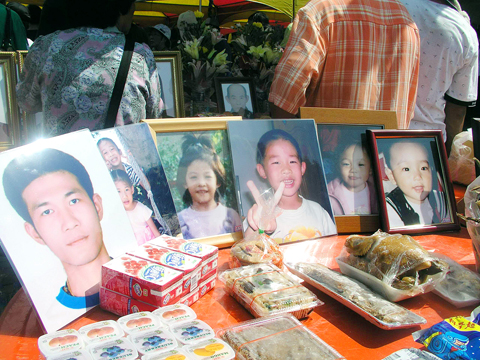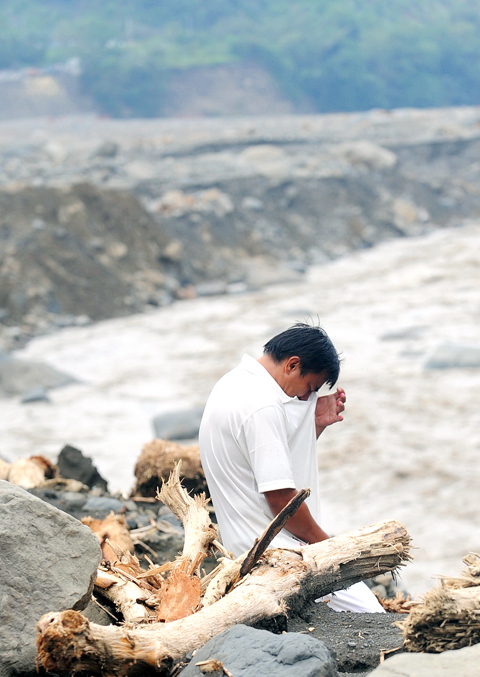Tears, sorrow, anger and emotional breakdowns yesterday marked the touqi (頭七) for victims buried alive in Xiaolin Village (小林), Jiaxian Township (甲仙), Kaohsiung County.
According to traditional Taiwanese belief, touqi — “the seventh day” after someone’s death — is the day when the spirit of the deceased returns home. According to tradition, family members of the deceased must prepare a treat for their loved ones and hold religious rituals to guide them to the proper destination.
Many Xiaolin villagers who were evacuated after most of the village was buried by landslides last Sunday returned yesterday to hold the touqi ritual.

PHOTO: LIN LIANG-CHE, TAIPEI TIMES
Survivors walked back and forth across the bare ground, stopping to light incense sticks and burn paper money for the dead. A monk rang a small bell, which people believe will help the souls of the dead find their way home.
Mourners cried and hugged each other at the service honoring family and friends who perished in the storm.
“Mom! I’m such a useless person! I promised to buy a small plot of farmland in Taipei for you to live and grow some vegetables,” a man surnamed Yeh (葉) cried on his knees. “But now everything’s gone, it’s gone, it’s all gone!”

PHOTO: LIAO YAO-TUNG, TAIPEI TIMES
Another woman in tears held a stack of photos and told reporters who the people in the pictures were.
“These are my parents, my brother, my nephews, their wives,” she said. “A total of 17 people in my family were all gone overnight.”
A man hit his head with a wine bottle and started bleeding after apologizing to his mother for not saving her. He was rushed to the township office for treatment.
Morakot dumped almost 3m of rain on southern Taiwan, triggering mudslides in southern highlands that stranded thousands in mountainous villages.
As many as 400 residents of Xiaolin village are believed to have been buried alive under mud as deep as 15m last Sunday.
The villagers had asked the army to stop digging for the victims because they want the dead to be left in peace and their mud-covered village turned into a memorial park.
Meanwhile, two navy landing craft yesterday morning landed on beaches in Taitung County’s Jhihben (知本) to deliver 200 tonnes of water and food supplies to Hsianglan (香蘭), Jinluen (金崙) and Dawu (大武) townships, where more than 20,000 residents were still stranded without food or potable water.
Vehicles carrying rescuers and supplies were also able to enter Highway 9 yesterday after the Directorate General of Highways managed to make the entire highway accessible from Taimali (太麻里) in Taitung County to Fonggang (楓港) in Pingtung County.
The Central Emergency Operation Center said yesterday that a total of 35,134 people had been evacuated.
About 3,200 remained stranded in Kaohsiung County and an additional 3,700 people remained cut off in Taitung county, while 9,000 were trapped in Chiayi county, local government officials said yesterday.
The National Police Agency asked those who had lost contact with loved ones since the typhoon to provide DNA samples at local police stations to help identify the dead.
Mount Zion, a Christian community living in isolation in the mountains in heavily devastated Namasiya Township (那瑪夏) in Kaohsiung County said that all its members — including seven who had been missing for seven days — survived the disaster, attributing their survival to God’s blessing.
“All [Mount Zion residents] did was keep praying to God,” Chang Ming-fa (張明法), a Mount Zion preacher, said in a video clip aired by FTV. “They prayed more than 10 times a day [when Typhoon Morakot hit].”
He also criticized the government for its delayed rescue effort.
“[President] Ma Ying-jeou [馬英九] is so proud that he doesn’t regard his own people as humans,” he said.
Criticism has been mounting on the Ma administration, with many claiming that the situation would not have been as serious had people living in disaster-torn areas been evacuated earlier.
On Thursday, Ma told Independent Television Network reporter Rahit Kachroo that if the victims had been better prepared, they would have left much earlier, adding that the disaster occurred because people didn’t fully understand the danger of remaining where they were.
Ma made a similar comment in his weekly video chat yesterday, saying that if people “could have been evacuated earlier, so many problems could have been solved.”
In a message posted on the PTT Bulletin Board System, a user named Easterly wrote that the designated evacuation point for Xiaolin Village was the Xiaolin Elementary School, which was also wiped out.
An evacuation map for the village on the Soil and Water Conservation Bureau’s Web site confirmed the claim.
“Could villagers really have avoided the tragedy by seeking refuge in that school?” he asked.
Another PTT user named Showgrace quoted a friend living in Sandimen Township (三地門), Pingtung County, as saying that when Typhoon Toraji hit in 2001, “military trucks were in the village waiting to evacuate us before the rain started pouring. But this time around, the mountains had collapsed and we still didn’t receive any help.”
“We heard all kinds of rumors: Some said the road was obstructed and told us to stay behind; others told us to go as soon as possible,” Showgrace quoted his friend as saying. “If no one would give us accurate information — such as whether the roads are still there — how were we supposed to evacuate?”
Scores of people protested when Ma yesterday tried to throw the opening pitch for a youth baseball championship in Taichung City. The president ended up leaving without throwing the ball.
Some spectators gave him the thumbs-down sign while security guards scuffled with protesters trying to unfurl a banner in the stands.
“So many people were killed and you attend a baseball game. Can you sleep at night?” an unidentified man shouted in front of TV cameras outside the stadium.
At press time yesterday, the fatalities from Typhoon Morakot had increased to 123, with 54 reported missing and 45 injured. Ma on Friday said the death toll could exceed 500 as hundreds are feared buried beneath the rubble.
Meanwhile, water supplies to 315,540 households remained cut off yesterday, while 18,140 households were still affected by power outages
Also awaiting repair were telephone services for 8,642 households, as well as 207 mobile phone base stations.
Financial losses suffered by the nation’s agricultural sector had reached nearly NT$11.8 billion (US$358.8 million) as of yesterday, statistics released by the Council of Agriculture showed.
The worst agricultural losses in Taiwan’s history were suffered when Typhoon Herb hit the nation in 1996, causing NT$18.8 billion in losses.

Conflict with Taiwan could leave China with “massive economic disruption, catastrophic military losses, significant social unrest, and devastating sanctions,” a US think tank said in a report released on Monday. The German Marshall Fund released a report titled If China Attacks Taiwan: The Consequences for China of “Minor Conflict” and “Major War” Scenarios. The report details the “massive” economic, military, social and international costs to China in the event of a minor conflict or major war with Taiwan, estimating that the Chinese People’s Liberation Army (PLA) could sustain losses of more than half of its active-duty ground forces, including 100,000 troops. Understanding Chinese

The Ministry of Foreign Affairs (MOFA) yesterday said it is closely monitoring developments in Venezuela, and would continue to cooperate with democratic allies and work together for regional and global security, stability, and prosperity. The remarks came after the US on Saturday launched a series of airstrikes in Venezuela and kidnapped Venezuelan President Nicolas Maduro, who was later flown to New York along with his wife. The pair face US charges related to drug trafficking and alleged cooperation with gangs designated as terrorist organizations. Maduro has denied the allegations. The ministry said that it is closely monitoring the political and economic situation

UNRELENTING: China attempted cyberattacks on Taiwan’s critical infrastructure 2.63 million times per day last year, up from 1.23 million in 2023, the NSB said China’s cyberarmy has long engaged in cyberattacks against Taiwan’s critical infrastructure, employing diverse and evolving tactics, the National Security Bureau (NSB) said yesterday, adding that cyberattacks on critical energy infrastructure last year increased 10-fold compared with the previous year. The NSB yesterday released a report titled Analysis on China’s Cyber Threats to Taiwan’s Critical Infrastructure in 2025, outlining the number of cyberattacks, major tactics and hacker groups. Taiwan’s national intelligence community identified a large number of cybersecurity incidents last year, the bureau said in a statement. China’s cyberarmy last year launched an average of 2.63 million intrusion attempts per day targeting Taiwan’s critical

AGING: As of last month, people aged 65 or older accounted for 20.06 percent of the total population and the number of couples who got married fell by 18,685 from 2024 Taiwan has surpassed South Korea as the country least willing to have children, with an annual crude birthrate of 4.62 per 1,000 people, Ministry of the Interior data showed yesterday. The nation was previously ranked the second-lowest country in terms of total fertility rate, or the average number of children a woman has in her lifetime. However, South Korea’s fertility rate began to recover from 2023, with total fertility rate rising from 0.72 and estimated to reach 0.82 to 0.85 by last year, and the crude birthrate projected at 6.7 per 1,000 people. Japan’s crude birthrate was projected to fall below six,